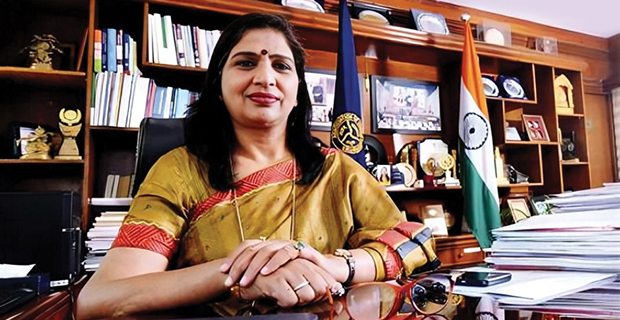“India becoming Global Education Hub”
In an exclusive interview, Dr. Pankaj Mittal, Secretary General, Association of Indian Universities (AIU), speaks to Business Editor Yogesh Sood
How do you ensure quality assurance in universities, especially in the context of accreditation and rankings? Is it a fair practice to rank our universities?
Quality assurance is a continuous process that requires a multi-faceted approach. AIU works closely with universities to help them meet global quality benchmarks through capacity-building, policy advocacy, and facilitating collaborations. While rankings provide a useful metric to gauge performance, it is essential to consider the diversity of Indian universities and their unique contexts along with other factors, such as the institution’s academic programs, faculty expertise, and student satisfaction. AIU encourages a holistic approach to assessment that goes beyond rankings to focus on quality improvement and student outcomes.
What role do you envision for emerging technologies such as AI in transforming Indian higher education, and how can AIU forge industry-university partnerships to bridge the gap?
Emerging technologies, particularly AI, hold immense potential to transform higher education in India by personalizing learning experiences, enhancing research, and improving administrative efficiency. AIU is working towards facilitating industry-university partnerships to integrate these technologies into curricula, research, and skill development programs. By bridging the gap between academia and industry, we can ensure that students are equipped with cutting-edge skills to meet the demands of the future workforce.
What opportunities do you see for AIU in promoting digital education and online learning? Do you endorse that Indian students should evolve with time for new job roles in the future?
AIU is committed to promoting digital education as it provides access to quality learning opportunities across geographic boundaries. Recently, AIU has issued a policy document on blended learning that supports the integration of online and hybrid learning models in Indian universities. As the job market continues to evolve, it is critical for students to adapt to new roles that emerge with technological advancements. AIU endorses lifelong learning and upskilling, and we support universities in offering flexible, industry-relevant programs to prepare students for the future.
Foreign universities are making a beeline in India. What role do you see for these universities in the globalization of education?
Establishing campuses by foreign universities in India will bring diverse perspectives, innovative pedagogies, and provide global exposure to Indian students. AIU sees this as an opportunity to enhance the quality of education in India and overall development of our academic ecosystem.
There is also a growing concern that higher education will become prohibitively expensive with foreign universities coming in. How do we ensure fair play and accountability in research?
India has one of the largest higher education systems in the world, comprising approximately 1,400 universities, 50,000 colleges, and 14,000 standalone institutions. The total enrollment in these institutions presently is 43.26 crore. Currently, only a limited number of foreign universities are set to establish campuses in India, and the number of students enrolling in these institutions is relatively very small compared to the total student population. As a result, the overall cost of higher education in India is unlikely to be significantly impacted. Additionally, students who would otherwise go abroad for higher education can now access the same quality education within India at a comparatively lower cost. Additionally, the University Grants Commission (UGC) has recently issued regulations for the Setting up and Operation of Campuses of Foreign Higher Educational Institutions in India and Academic Collaboration between Indian and Foreign Higher Educational Institutions to offer Twinning, Joint Degree, and Dual Degree Programmes. These regulations ensure fair play and accountability in academic collaborations, providing a transparent framework for maintaining quality and standards.
How do you envision AIU fostering international collaborations and partnerships? Can you share any successful international partnership models that AIU has facilitated?
AIU is aligning with the National Education Policy (2020) to promote the internationalization of higher education, aiming to position India as a preferred destination for affordable, quality education while encouraging ‘internationalization at home.’ This involves fostering collaborations in research, teaching, and partnerships with foreign universities, enhancing the global academic environment. Recent initiatives include the Bharat Nepal Higher Education Summit held in February, 2024, hosted by Kathmandu University, which aimed to strengthen educational ties between India and Nepal, featuring participation from academic leaders across multiple countries and around 2000 Nepalese students. Another significant event, the Bharat-Vietnam Higher Education Summit in August 2024, included over 50 universities from both countries and led to a Memorandum of Understanding between the respective associations of universities. These summits encourage joint programs, research collaborations, and exchanges, contributing to India’s growing reputation as a global education hub.
What strategies should we employ to attract foreign students and faculty to Indian universities?
To attract foreign students and faculty, Indian universities must focus on enhancing their global reputation by offering world-class academic programs, state-of-the-art research facilities, and a welcoming campus environment. AIU is working with institutions to internationalize their curricula, improve infrastructure, and promote cultural exchange programs. Additionally, we advocate for streamlining administrative processes such as visas and admissions to make it easier for international students and faculty to engage with Indian universities.











Comments.